Boston Red Sox: Mookie Betts in good company as MVP runner-up

Mookie Betts fell short of capturing the AL MVP Award, but finishing in second place puts him in good company with several Boston Red Sox legends.
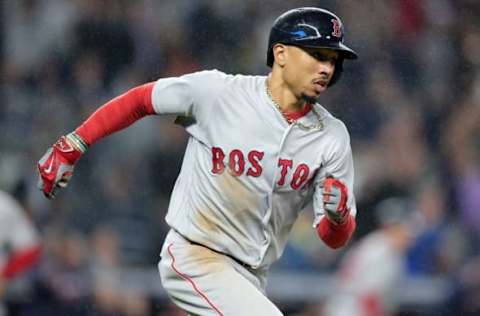
I really thought Mookie Betts was going to win the American League MVP Award. I’ve covered the multitude of reasons why the star outfielder for the Boston Red Sox deserved the honor, but what’s done is done. Mike Trout is our 2016 MVP and there’s no shame in finishing second to an outstanding talent that has been widely considered to be the best player in baseball since he entered the league.
Being named the runner-up for the award also puts him in pretty good company. Trout has finished second on the ballot three times in his career and the last two times that happened he followed it with a season that earned him the hardware. He’s never won two years in a row, so perhaps this is a reason to be optimistic that Betts can supplant him next season.
A look back at Red Sox history shows us that a number of iconic players for this franchise have finished as the runner-up in the MVP race. This year marked the 13th time that a Red Sox player has finished in second place for the award.
Let’s take a look at the Red Sox players that finished as a runner-up before Betts.
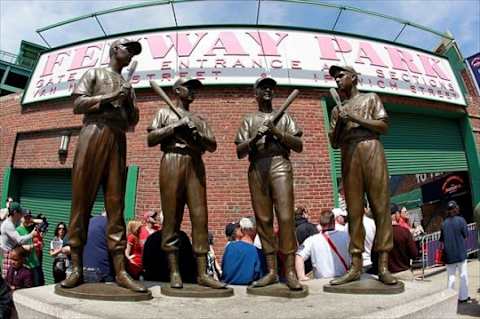
Ted Williams
The legendary Ted Williams was the runner-up for MVP four times (1941, 1942, 1947, 1957). The Splendid Splinter won the batting title in each of those seasons, including one year when he hit an astounding .406, making him the last player to qualify for a batting title to hit over .400 in a season.
Williams’ ornery personality didn’t leave him with the best relationship with the media members that voted for the award, which may have cost him a trophy or two.
He also had the misfortune of playing in an era when the postseason format of today didn’t exist. Back in those days the top team in each league went to the World Series and MVP voters leaned heavily toward the top player on that team. Unfortunately for Williams, that team was rarely the Red Sox. In his 19 year career he only played in one World Series, a losing effort in 1946, the year Williams won the first of his two career MVP awards.
It also didn’t help that he competed against loaded New York Yankees teams boasting several all-time great players. He finished second to Joe DiMaggio twice, then a decade later fell short to Mickey Mantle.
Williams won the Triple Crown twice in his career, yet didn’t win the MVP in either season.
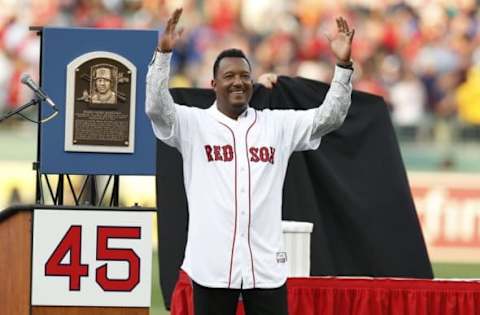
Pedro Martinez
Who could forget the controversial 1999 ballot that saw Pedro Martinez finish second? In his second season with the Red Sox, Pedro delivered one of the most dominant performances by a pitcher in the modern era. He went 23-4 with a 2.07 ERA and 313 strikeouts, giving him the coveted Triple Crown of pitching to run away with the first of the two consecutive Cy Young Awards he would capture as a member of the Red Sox.
More from Red Sox News
- Red Sox Nation deserves far more from Fenway Sports Group
- Bizarre trade deadline comes back to haunt Red Sox after Nathan Eovaldi departure
- Red Sox’ Moneyball-style offseason continues with Corey Kluber contract
- Rich Hill’s Red Sox departure puts him within striking distance of unique MLB record
- Red Sox offseason takes another nasty hit with Nathan Eovaldi departure
When it came to the MVP, Pedro received the most first-place votes, but fell short of winning when two writers left him off their ballot completely. Their logic was essentially that pitchers had their own award and shouldn’t be eligible for the MVP since they don’t play everyday.
Personally, I typically lean toward hitters for that very reason, but that doesn’t mean I would omit a pitcher that had a historically great season. If they felt these reasons were sufficient to give their first-place vote to Ivan Rodriguez, fine, but to not have Pedro on their ballots at all was an atrocity.
How did Pedro handle being snubbed by these voters? By following up with what was arguably an even better season, producing a 1.74 ERA, 0.73 WHIP and league-leading 284 strikeouts.
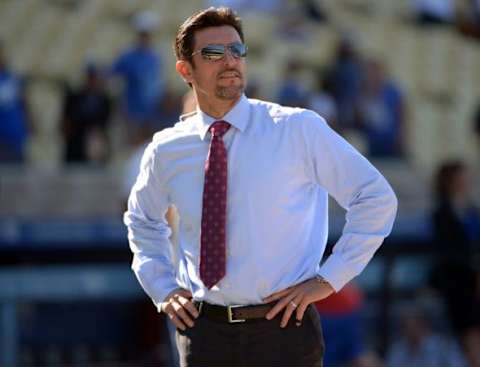
Nomar Garciaparra
Nomar Garciaparra followed his outstanding Rookie of the Year season by finishing second in the MVP race in 1998. The Red Sox star shortstop hit .323 and set what would be career-highs with 35 home runs and 122 RBI. Those numbers are similar to what Betts put up this year in what was also his second full season in the league, so there are some interesting parallels between the two.
Despite a career year, Nomar fell short to Juan Gonzalez of the Texas Rangers. Juan-Gon smashed 45 homers, 50 doubles and drove in a league-leading 157 RBI.
The power numbers were impressive, even by the standards of that tainted era, but Garciaparra still had the better overall season. He posted a 7.1 WAR that season, while the one-dimensional Gonzalez trailed at 4.9 WAR. It makes you wonder if the results would have been reversed if they played in today’s more analytics driven environment.
Nomar would follow that season with a pair of batting titles and four more All-Star appearances during his time in Boston. He was dealt to the Chicago Cubs in 2004 and was never really the same after that, as injuries curtailed a once promising career.
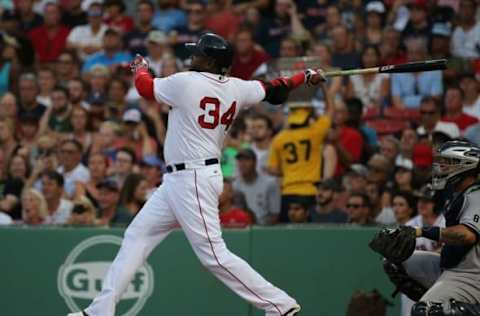
David Ortiz
It’s shocking that a hitter the caliber of David Ortiz never won an MVP in his storied career, but he did come close in 2005 when he slugged 47 homers and drove in a league-leading 148 RBI. He hit .300/.397/.604 that season, which combined with those power numbers would make him an MVP contender in almost any season.
More from Red Sox News
- Red Sox Nation deserves far more from Fenway Sports Group
- Bizarre trade deadline comes back to haunt Red Sox after Nathan Eovaldi departure
- Red Sox’ Moneyball-style offseason continues with Corey Kluber contract
- Rich Hill’s Red Sox departure puts him within striking distance of unique MLB record
- Red Sox offseason takes another nasty hit with Nathan Eovaldi departure
Except that year he was up against Alex Rodriguez in his prime. A-Rod led the league with 48 home runs, a .610 SLG and 1.031 OPS. At that point in his career he was still a solid defensive player, boosting his value to 9.4 WAR, which easily bested Ortiz’s 5.3 WAR.
A-Rod was a fair selection that year, but Ortiz had the offensive numbers the following season when he blasted a franchise record 54 home runs to lead the league, along with an AL best 137 RBI. Yet that season he finished third on the ballot, while Justin Morneau took home the hardware with numbers that paled in comparison to what Ortiz produced.
The difference-maker was that Ortiz never provided any defensive value.
The bias against the designated hitter held him back on more than one occasion, but it won’t hold him out of Cooperstown.
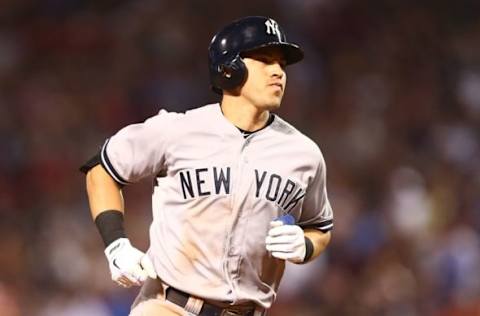
Jacoby Ellsbury
The most recent Red Sox player to finish second in MVP voting was Jacoby Ellsbury in 2011, who finished behind Detroit Tigers ace Justin Verlander. Apparently writers had gotten over their concerns with voting for pitchers by that point.
The star center fielder showed uncharacteristic power that season, blasting 32 home runs – which to this day is double what he’s produced in any other season. Ellsbury hit .321/.376/.552, all of which were career-highs, but he didn’t lead the league in any major category beyond plate appearances and total bases. He finished second in the league with an 8.0 WAR in a relatively weak crop of hitters that season, which helped open the door for Verlander to steal the award as a pitcher.
Three years later Ellsbury would parlay that mammoth season into a lucrative contract with the New York Yankees, one they would soon regret after realizing 2011 was a clear outlier.
He did have another strong season in his final year in Boston in 2013, serving as a key cog in another championship season, but finished only 15th on the ballot that year and hasn’t received any votes for the award since.
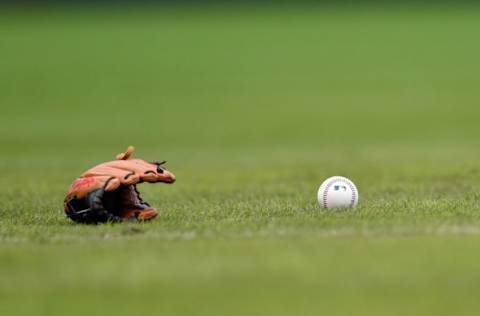
Rest of the runner-ups
Wes Ferrell (1935)
The former Red Sox pitcher started 38 games and tossed 322 1/3 innings, an unfathomable workload by today’s standards. Ferrell led the league with 25 wins and 31 complete games, while posting a 3.52 ERA.
Detroit Tigers first baseman Hank Greenberg topped Ferrell to win the MVP that year. He hit .328 with a 1.039 OPS, while leading the league with 36 home runs and 168 RBI.
Jimmie Foxx (1939)
Foxx won his third career MVP in 1938, the first and only of which came in a Red Sox uniform, but he had to settle for second place the following season. The man they called the Beast led the league with 35 home runs, a .464 OBP and .694 SLG. Impressive numbers, but well short of his dominant season that earned him the hardware the previous year.
Joe DiMaggio won his first career MVP in ’39 in what would be the first of several times the Yankee Clipper would finish just ahead of a Red Sox hitter for the award.
Billy Goodman (1950)
Goodman was the Brock Holt of the 50’s, spending time at five different positions. The versatile fielder was pretty good with the stick too, winning a batting title with a .354 average. He didn’t have the pop that you expect from most MVP candidates, tallying a mere 4 home runs and driving in only 68 runs. Despite owning a WAR of only 2.7, Goodman’s league-leading batting average carried him to the runner-up spot behind – surprise, another Yankee – Phil Rizzuto.
Mike Greenwell (1988)
The former Red Sox left fielder finished second on the ballot in his second full season in the big leagues at the age of 24. Greenwell hit .325 with 22 home runs and 119 RBI to lead the team to an AL East division title.
Greenwell made his first of consecutive All-Star appearances that season, which would prove to be his only selections to the Mid-Summer Classic.
Next: What's next for Rusney Castillo?
Jose Canseco stole the MVP that year on the strength of his league-leading 42 homers. We now of course know that the former Bash Brother’s accolades are tainted by his admitted use of performance enhancing drugs. Of all the runner-ups on this list, Greenwell may have the best case for having been robbed of the award, since we know the guy that beat him was cheating.